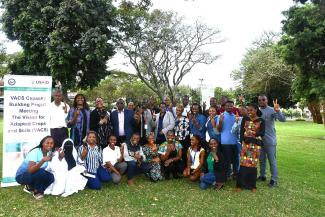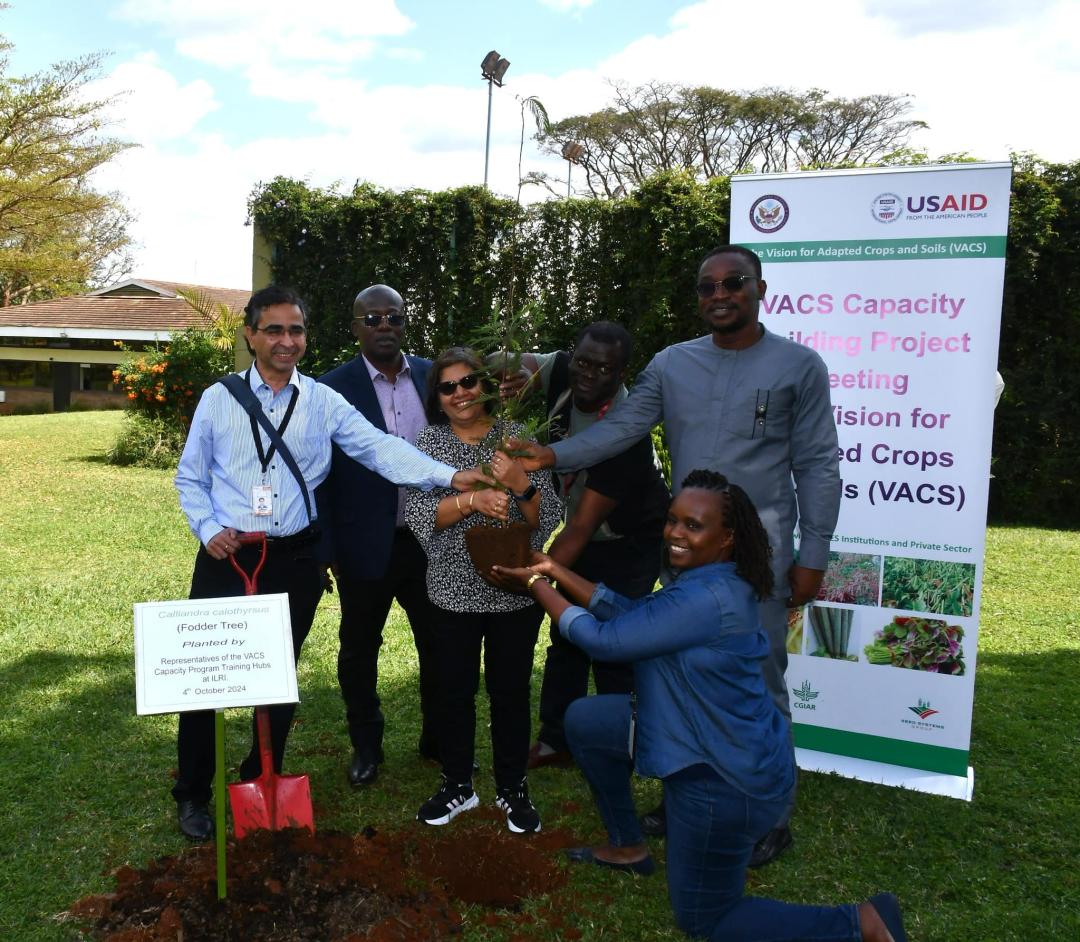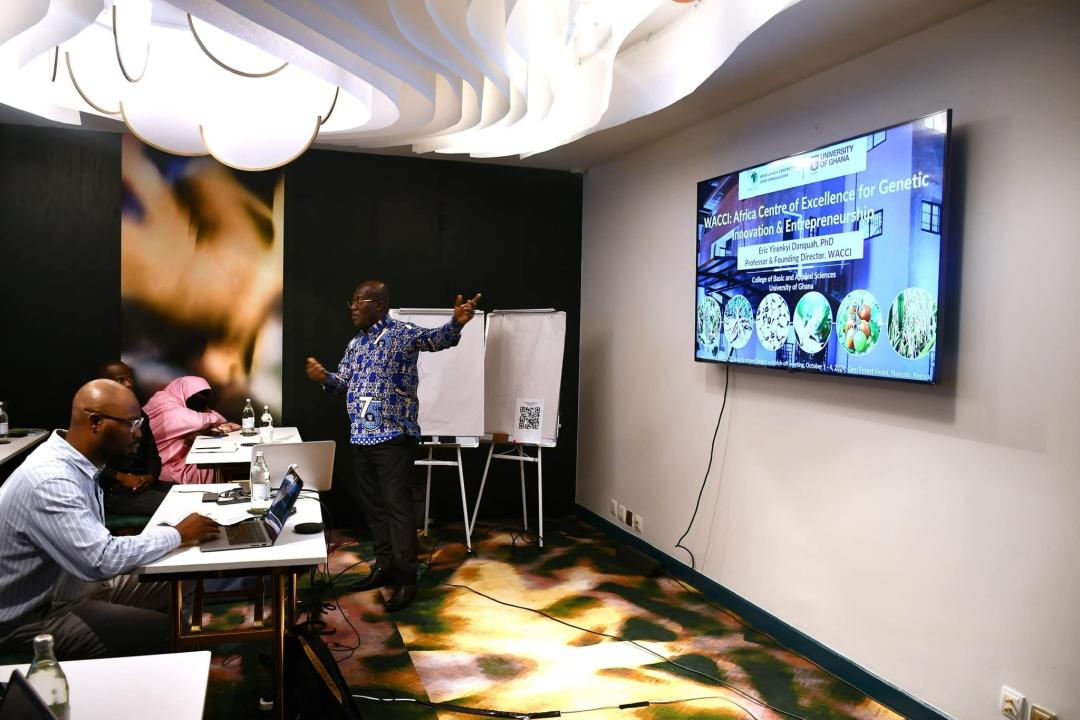
University of Ghana’s WACCI Selected as Key Hub for the Vision for Adapted Crops and Soils (VACS) Capacity Building Program
Following 17 years of leadership in agricultural research, capacity building and the promotion of climate-smart agricultural solutions, the West Africa Centre for Crop Improvement (WACCI), one of the World Bank Africa Centres of Excellence at the University of Ghana, is poised to lead efforts in advancing agricultural resilience across the continent.
This follows its selection as one of three key hubs for the Vision for Adapted Crops and Soils (VACS) Capacity Building Programme. The initiative positions WACCI to spearhead transformative crop and soil innovations critical to tackling food security and climate challenges in Africa.
The VACS Capacity Building Programme, fronted by the International Maize and Wheat Improvement Center (CIMMYT) and supported by USAID under the Feed the Future Initiative, seeks to equip the next generation of African agricultural scientists and breeders with the skills to drive sustainable crop and soil innovations across the continent.
In a competitive selection process involving 43 institutions across Africa, America and Europe, WACCI secured its position as one of the three VACS hubs due to its reputation for excellence in agricultural research and training.
The Centre joins the International Institute of Tropical Agriculture (IITA) and Biosciences for East and Central Africa (BecA)-International Livestock Research Institute (ILRI) hub in this transformative initiative.
As a hub, WACCI will mentor and train VACS Fellows, equipping them to lead impactful agricultural initiatives throughout Africa. The official launch of the programme took place in Nairobi in October 2024 and brought together leaders, fellows and partners from the three hubs.

Participants engaging in a tree-planting exercise to commemorate the launch of the VACS initiative.
Representing WACCI at the event to unveil the winners were the Founding Director, Prof. Eric Y. Danquah, and the Deputy Director of Research, Innovation and Development, Dr. Agyemang Danquah.
Delivering remarks at the launch, Dr. Sieglinde Snapp, Director of CIMMYT’s Sustainable Agrifood Systems Programme, detailed the goal of the initiative. She noted that the VACS would support inclusive breeding programme and seed systems to address the rising demand for opportunity crops.
Agricultural Research Advisor with USAID and Activity Manager for CIMMYT and the VACS Capacity Team, Dr. Tracy Powell, in her address, underscored the importance of promoting a sense of community among the VACS Fellows. She highlighted the value of building lasting professional networks and urged the hubs to work towards achieving the goals of VACS.
Dr. Powell further connected the programme’s objectives to USAID’s broader mission, saying, “In making these investments, USAID really acknowledges the alignment between VACS and the U.S. Government’s overarching strategy to reduce and eliminate global hunger, poverty and malnutrition, which is the Feed the Future Initiative.”
Adding to the discourse, Prof. Julia Sibiya, VACS Capacity Project Lead, identified challenges related to over-reliance on staple crops like maize, rice, wheat and cassava. She stressed the importance of building local expertise in opportunity crops, noting that the scarcity of African scientists specialising in these crops limits progress.
Prof. Sibiya stated, “The goal of the Feed the Future VACS Capacity programme is to strengthen the skills of our scientists and create a critical mass of experts to advance research on these vital crops.”
Speaking on behalf of WACCI, Founding Director Prof. Eric Y. Danquah outlined the Centre’s achievements and vision. He recounted its growth from WACCI 1.0, funded by the Alliance for a Green Revolution in Africa, to the current WACCI 3.0, supported by the World Bank’s Africa Centres of Excellence Project.

Prof. Eric Y. Danquah delivering a presentation at the VACS Capacity Building Programme launch in Nairobi, Kenya.
Prof. Danquah noted, “Partnering with over 40 institutions globally, WACCI and its alumni have secured over $100 million in funding, enabling it to provide world-class training and drive impactful agricultural research.”
He reiterated WACCI’s commitment to training Africans for Africa through its PhD programme in Plant Breeding, which has produced 117 graduates from 15 African countries. “These graduates are transforming the agricultural landscape, particularly in staple and neglected crops critical to food security and economic resilience,” he revealed.
He also stressed WACCI’s vision of becoming a global hub for agricultural innovation, focusing on neglected and underutilised crops, now referred to as ‘opportunity crops,’ to enhance nutritional security and climate resilience. The WACCI Director also mentioned that “the Centre will work closely with CGIAR and other key stakeholders to shift the narrative around neglected crops and demonstrate their potential for driving economic growth and nutritional resilience.”
Commenting on the achievement, Prof. Nana Aba Appiah Amfo, Vice-Chancellor of the University of Ghana, congratulated the WACCI team. She said, “Hearty congratulations to you, WACCI, and the University of Ghana. You continue to make us proud, and I am confident that this initiative will further enhance graduate training here at the University of Ghana.”
She added, “It aligns perfectly with our vision of achieving global impact through excellence in research and education.”
The VACS launch event also featured presentations from leaders of the other hubs and a tour of the advanced biotechnology facilities at the BecA-ILRI Hub.

Fellows explored cutting-edge tools and technologies for crop breeding, with interactive sessions demonstrating the importance of modern techniques such as genome editing and bioinformatics for tackling agricultural challenges, including climate adaptation, disease resistance and nutrition enhancement.
Through the support of CIMMYT, USAID and other international partners, WACCI and the other VACS hubs are set to inspire and empower a new generation of African scientists and breeders, creating lasting change in Africa’s agricultural landscape.
